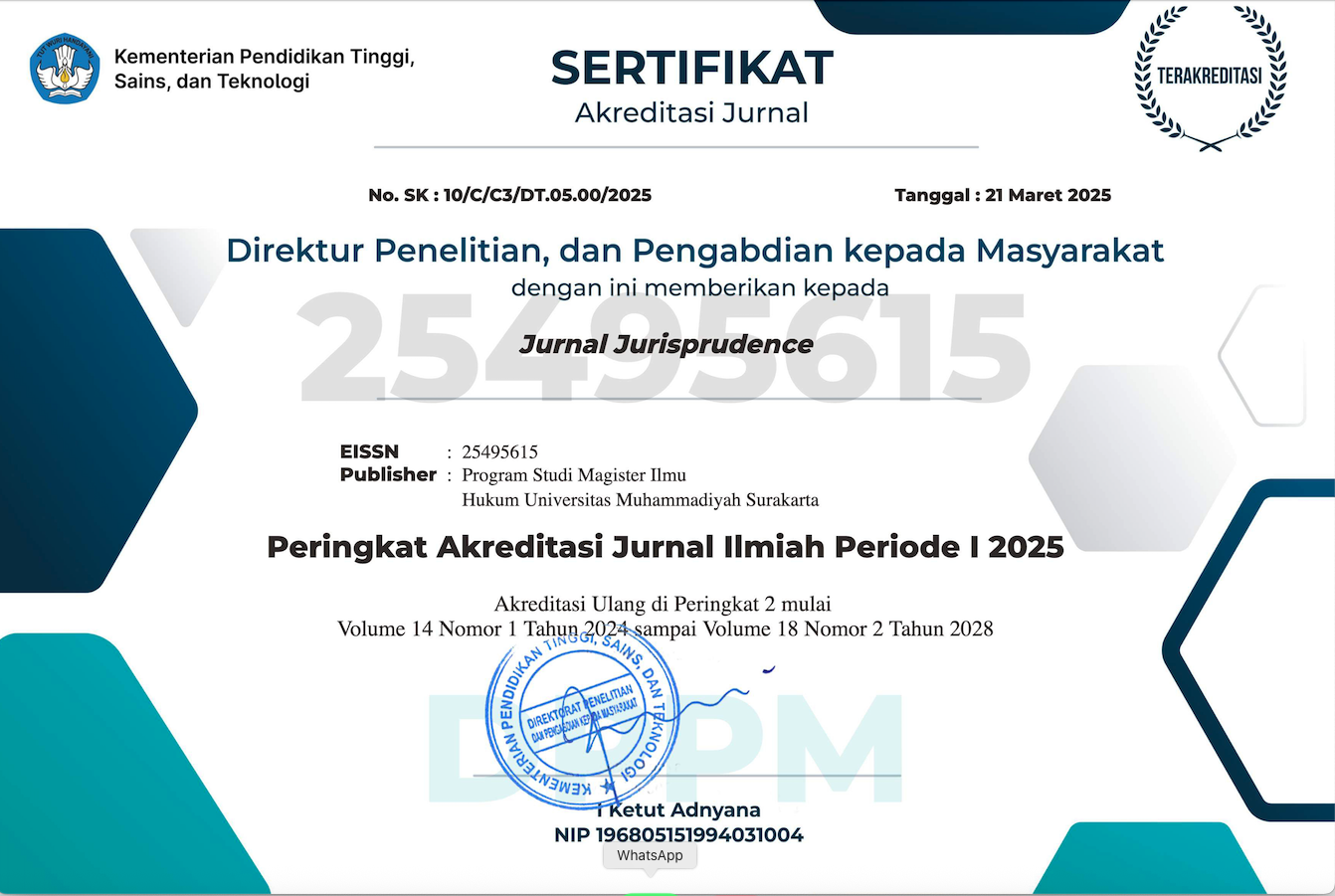Review of Judges ' Consideration in the Court Decision Regarding the Illegal Sale of Subsidized Fertilizer: Comparison of Indonesian and Uzbekistan
DOI:
https://doi.org/10.23917/jurisprudence.v14i1.4419Keywords:
economic crime, subsidized fertilizer, trade, tindak pidana ekonomi, pupuk bersubsidi, perdanganganAbstract
ABSTRACT
Purpose of the study: This research aims to review the subsidized fertilizer trade from the standpoint of the National Criminal Law, taking into account both the policy considerations that went into its formulation and the background information provided by the judge in two court decisions (Decision No.19/Pid Sus/2022/Fr.Pti. and the decision of MA 105 K/Pid.Sus/2019). It also looks at how the disparities in legal rulings have affected the criminal act of subsidized fertilizer sales between Indonesia and Uzbekistan as per Law No. 93 of 1997 concerning the Criminal Code of the Republic of Uzbekistan Article 177.
Methodology: Normative research approach to legislation and case approach. Secondary data were gathered from legal documents. Results: Since subsidized fertilizer is a good under supervision under the Ministry of Trade of the Republic of Indonesia No. 15/M-DAG/PER/4/2013 on the procurement and distribution of subsidized fertilizer in the agricultural sector, the trade must have a license in accordance with Presidential Regulation of the Republic of Indonesia No. 15/2011 on amendments to Presidential Regulation No. 77 of 2005 on the determination of subsidized fertilizer as a good under supervision. Trading actors who disregard this clause are liable for errors in the form and for not having the proper authorization or authority to trade subsidized fertilizer, according to the defendant's Decision No. 19/Pid Sus/2022/PN.Pti. and the Decision of MA 105 K/Pid.Sus/2019. The dangerous nature of the perpetrator's actions also makes them classified as economic crimes because they have the potential to disrupt the national economy. This study aims to compare the legal framework, legal proceedings, and punitive measures of the judge's rulings on the criminal act of illegal fertilizer sales in Uzbekistan and Indonesia. The laws that govern plant cultivation systems in Indonesia are Law Number 12 of 2019, Law No. 8 of 1999 on Consumer Protection, and Criminal Code Article 386, which imposes fines, administrative penalties, and jail time. The legal procedure entails a police or Civil Servant Investigator's investigation, a prosecutor's prosecution, and a trial involving the cross-examination of witnesses and evidence. Illegal fertilizer trade is punishable by law in Uzbekistan under Law No. 93 of 1997 concerning the Criminal Code of the Republic of Uzbekistan, Article 177, and Law No. 221-I of 1996 concerning the Protection of Consumer Rights, with fines, social work, or incarceration as possible forms of punishment. The legal process entails an inquiry conducted by investigative entities, an accusation made by prosecutors, and a trial during which witnesses are questioned and evidence is presented. Only one case—the Navoiyazot case—has made it to the Uzbek court thus far.
Applications of this study: This research can be applied to examine economic crimes committed against the supervision of trade in goods, particularly fertilizers that are subsidized. It is also to compare the conditions of the illicit sale of fertilizers that have been subsidized in Uzbekistan and Indonesia, as well as the rulings made by the courts.
Novelty/Originality of this study: This study is novel in that it examines the trade of fertilizers that are illegally subsidized between two nations.
Keywords: economic crime, subsidized fertilizer, trade.
ABSTRAK
Tujuan: Penelitian ini bertujuan untuk mengkaji perdagangan pupuk bersubsidi dari perspektif hukum pidana nasional dari aspek kebijakan formulasinya serta dari aspek latar belakang keputusan hakim dalam putusan pengadilan (Putusan No. 19/Pid Sus/2022/PN.Pti. dan Putusan MA 105 K/Pid.Sus/2019 serta mengkaji bagaimana perbedaan putusan hukum yang diterapkan terhadap tindak pidana penjualan pupuk bersubsidi antara Indonesia dengan Uzbekistan pada Law No. 93 of 1997 concerning Criminal Code of the Republic of Uzbekistan Pasal 177.
Metodologi: Penelitian normatif pendekatan perundang – undangan dan pendekatan kasus. Data yang dibutuhkan data sekunder yaitu dokumen hukum.
Temuan: Pupuk bersubsidi sebagai barang dalam pengawasan, sehingga perdagangannya harus ada izin sebagaimana ditetapkan Peraturan Presiden Republik Indonesia No 15 /2011 Tentang Perubahan Atas Peraturan Presiden Nomor 77 Tahun 2005 Tentang Penetapan Pupuk Bersubsidi Sebagai Barang Dalam Pengawasan jo Peraturan Menteri Perdagangan RI No 15/M-DAG/PER/4/2013 tentang Pengadaan dan Penyaluran Pupuk Bersubsidi Sektor Pertanian. Pelakuperdagangan yang tidak sesuai dengan ketentuan ini berdasarkan Putusan terdakwa No. 19/Pid Sus/2022/PN.Pti. dan Putusan MA 105 K/Pid.Sus/2019., bahwa terdakwa melakukan kesalahaan dalam bentuk tanpa izin atau tanpa kewenangan memperjualbelikan pupuk bersubsidi. Selanjutnya perbuatan pelaku dikategorikan sebagai tindak pidana ekonomi karena sifat berbahaya perbuatan bisa berdampak pada gangguan tingkat perekonomian nasional. Perbandinganputusan hakim terhadap tindak pidana penjualan pupuk ilegal di Indonesia dan Uzbekistan meliputi dasar hukum, prosedur peradilan, dan jenis hukuman. Di Indonesia, dasar hukum terdiri dari Undang-Undang Nomor 12 Tahun 2019 tentang Sistem Budidaya Tanaman, Undang-Undang No. 8 Tahun 1999 tentang Perlindungan Konsumen, dan KUHP Pasal 386, dengan hukuman berupa penjara, denda, dan sanksi administratif. Proses peradilan melibatkan penyidikan oleh kepolisian atau PPNS, penuntutan oleh jaksa, dan persidangan dengan pemeriksaan saksi dan bukti. Di Uzbekistan perdagangan pupuk illegal adalah perbuatan criminal berdasarkan Law No. 93 of 1997 concerning Criminal Code of the Republic of Uzbekistan Pasal 177 dan serta Law No. 221-I of 1996 concerning on Protection of Consumer Rights, dengan hukuman berupa penjara, denda, atau kerja sosial. Proses peradilan melibatkan penyidikan oleh badan investigasi, penuntutan oleh jaksa, dan persidangan dengan presentasi bukti dan pemeriksaan saksi. Sejauh ini baru satu kasus yang masuk kepengadilan Uzbekistan yaitu kasus Navoiyazot.
Kegunaan: Dapat dimanfaatkan untuk kajian – kajian tindak pidana ekonimi terhadap perdagangan barang dalam pengawasan terutama pupuk bersubsidi. Dapat membandingkan ketentuan penjualan secara illegal pupuk bersubsidi di Indonesia dan Uzbekistan serta bagaimana pengadilan memutuskan.
Kebaruan/Orisinalitas: Kebaharuan penelitian ini adalah pada kajian mengenai putusan tentang perdagangan pupuk bersubsidi secara illegal terkait dua negara.
Kata Kunci: tindak pidana ekonomi, pupuk bersubsidi, perdangangan
Submitted
Accepted
Published
Issue
Section
License
Copyright (c) 2024 Jurnal Jurisprudence

This work is licensed under a Creative Commons Attribution 4.0 International License.

















